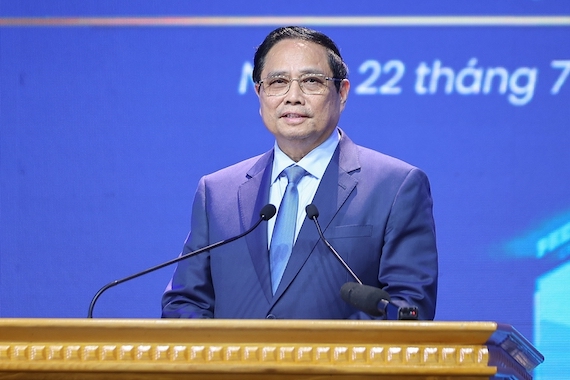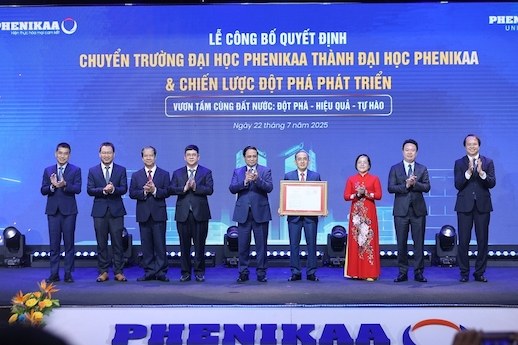On the afternoon of July 22, in Hanoi, Prime Minister Pham Minh Chinh attended the ceremony to announce the decision to convert Phenikaa University into Phenikaa University.
Speaking at the event, Prime Minister Pham Minh Chinh emphasized that the transformation into Phenikaa University is of great significance in affirming the relationship between training - research - innovation and promoting the relationship between research, production, society and the market.
According to the Prime Minister, in the new era of the country - the era of rising up for strong, civilized and prosperous development of the nation, science and technology, innovation, digital transformation and training of high-quality human resources have special strategic significance to contribute to achieving the two 100-year goals of the country (by 2030 becoming a developing country, with modern industry, high average income and by 2045 being a developed country, high income).

These are also foundational factors that play a particularly important and indispensable role in the development of the economy, especially in 3 aspects: Promoting economic restructuring, changing the growth model in a fast and sustainable direction; improving labor productivity, productivity of factors of the whole economy (TFP); improving the competitiveness and integration of the national economy.
Developing science and technology, innovation, digital transformation and training high-quality human resources are consistent policies and top priorities, and are components of the "four pillars of the ministry", concretized in the resolutions of the Party Congress, resolutions, conclusions and instructions of the Central Committee, the Politburo, the Secretariat, the National Assembly, the Government, and the Prime Minister. The agencies are also continuing to build, complete, and submit to the Politburo to issue resolutions to create breakthroughs in the development of education and training, health care, and the state economy.

The Prime Minister highly appreciated the results that Phenikaa University and Phenikaa Group have achieved in recent times; basically agreed with the directions, tasks, and key solutions set by Phenikaa University; hoped that the university would continue to promote the achieved tradition and results, the aspiration for self-reliance and self-strengthening, contributing to promoting training, research, and innovation, contributing significantly to improving the quality of higher education, contributing to the rapid and sustainable development of the country.
The Prime Minister also suggested that Phenikaa University adhere to the vision, mission, and core values of the educational philosophy: "Respect - Creativity - Criticism". Along with that, continue to improve the integrated university model, build a transparent governance system, effectively control internally, promote autonomy, associated with social accountability.
Promote scientific research activities, innovation and technology transfer in a systematic and professional manner to solve practical problems of businesses, markets, and the economy associated with the development trend of the times.
Expand practical training programs in the direction of interdisciplinary, associated with priority national technology industries; continue to promote the results achieved in research and development of core technologies, strategic technologies (such as advanced semiconductor chip design, autonomous technology, robot and automation, energy storage technology, biometric technology for precision medicine...).
Along with that, promote international cooperation for academic exchanges, while increasing participation in global training - research - innovation value chains and networks.
The Prime Minister directed the development and implementation of a mechanism to support students and scientists to start businesses, commercialize research results, especially support for poor students, etc.
The Prime Minister also requested the Ministry of Education and Training, the Ministry of Science and Technology, relevant ministries, branches and localities to speed up the progress of completing the legal framework in the field of education and training; coordinate in developing policies, programs, support funds and financial institutions strong enough to support universities to participate in research and development of core technologies, have special policies for special fields and special subjects; promote connectivity between schools - research institutes - enterprises - society - market on the basis of establishing a financial - intellectual property - sharing appropriate benefits, harmonious benefits, and shared risks.











